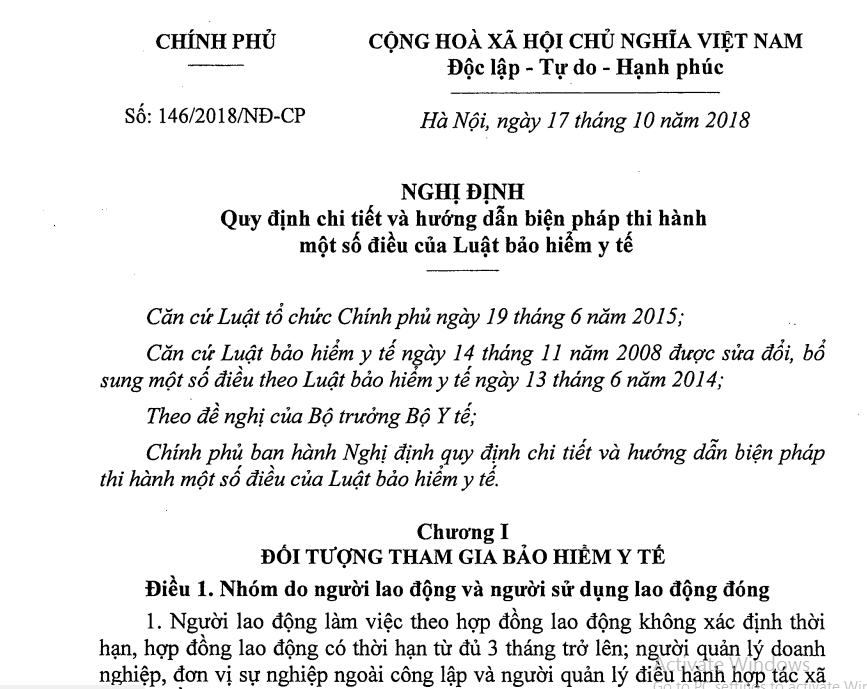Currently, the Ministry of Finance is urgently seeking opinions to amend and supplement certain provisions of the Law on Insurance Business (expected to be submitted to the National Assembly for consideration and approval at the 8th session at the end of this year) in order to enhance the effectiveness of this Law in socio-economic life, align with Vietnam's WTO commitments in the field of insurance business, and international insurance principles, while also raising the requirements for state management.
The Electronic Finance Magazine introduces readers to several main issues of the forthcoming amendments to the Insurance Business Law, which include 3 groups of issues related to 11 contents in 15 articles (out of a total of 129 articles of the current law).
Priority Application of Specialized Laws
In practice, there have been different interpretations and implementations due to inconsistencies between the Insurance Business Law and other regulations (Enterprise Law, Investment Law, etc.), leading to varying understandings and treatments, especially in disputes between insurers (DNBH) and policyholders. For instance, in disputes regarding insurance contracts, courts often rely on the Civil Code (regarding insurance contracts) for judgment, which may not accurately reflect the nature of insurance business activities.
To address this limitation, in the draft Law amending and supplementing a number of articles of the Insurance Business Law, the Ministry of Finance has proposed prioritizing the application of the Insurance Business Law's regulations - allowing the use of the Insurance Business Law when there are other laws addressing the same content related to insurance business activities. This approach has precedents as several laws that have been enacted also include similar provisions for prioritizing specialized laws.
Establishment of a Policyholder Protection Fund
In the Draft Law amending and supplementing a number of articles of the Insurance Business Law, the Ministry of Finance has also made several proposals for protecting policyholders. For instance, concerning insurance contracts, Article 15 of the current Insurance Business Law stipulates the inception of insurance liability as "insurance liability arises when an insurance contract has been concluded or when there is evidence that the insurer (DNBH) has accepted the insurance and the policyholder has paid the insurance premium, except where otherwise agreed in the insurance contract."
However, recently, various interpretations and applications of this provision have aimed at profiteering, affecting the rights of insurers (DNBH). Therefore, the amended Insurance Business Law seeks to clarify the inception of insurance liability to enhance the legal effectiveness of insurance contracts, specifically by adding more provisions regarding the inception of insurance liability in addition to the stipulations of concluding an insurance contract and fully paying premiums. Additionally, for the protection of policyholders in case an insurer goes bankrupt, the current law states, "insurers and insurance brokerage firms must establish a mandatory reserve fund to supplement charter capital and ensure solvency. The mandatory reserve fund is allocated annually at a rate of 5% of post-tax profits. Besides this reserve fund, insurance brokerage firms may set up other reserve funds from post-tax profits of the fiscal year, as provided in the charter of insurance companies and brokerage firms."
To address the issue of protecting the interests of policyholders in cases of financial difficulties of the insurer, some countries in the region such as China and Japan mandate the establishment of guarantee funds, a practice that not only reassures participants but also minimizes potential risks to the financial market. However, at present, the establishment of insurance guarantee funds in our country is not yet appropriate. Therefore, to meet the goal of protecting policyholders, the amended Insurance Business Law will stipulate that, in addition to setting aside technical reserves based on retained insurance premiums, insurers must establish a policyholder protection fund sourced from the insurers' premiums in accordance with the regulations set by the Government of Vietnam.
Mr. Ha Van Hien, Chairman of the Economic Committee of the National Assembly, emphasized the need for a fund to ensure the interests of the policyholder, to be derived from premiums but when established should be deposited into a financial institution, similar to the mandatory reserve requirement for commercial banks. Thus, there may be two types of funds, one to protect policyholder interests and one as a financial reserve for insurers.
Concurring with this viewpoint, Vice Chairman of the National Assembly Nguyen Duc Kien noted the necessity of clearly identifying the agency and mechanism for managing this fund, while also considering the impact on insurers.
Provision of Cross-border Insurance Services
According to commitments with the WTO, Vietnam permits the provision of cross-border insurance services; however, the current Insurance Business Law does not regulate this activity as it is sensitive in many aspects, especially concerning competition between domestic and foreign insurers; furthermore, this activity involves the movement of capital from within the country abroad through premium payments, as well as the flow of money into Vietnam through compensation payments.
International experience shows that countries are very restrictive regarding cross-border insurance service provision like in China, South Korea, Taiwan, the United States, Japan, etc. Some countries allow this activity but accompany it with very stringent and tight regulations.
Given this reality, the draft Law amending and supplementing the Insurance Business Law of Vietnam will only stipulate principles, while the Government of Vietnam will guide the specific regulations based on prudent management criteria allowed by the WTO, such as conditions for foreign insurers; requirement to deposit in Vietnam corresponding to the insurance liability in Vietnam, etc. to protect the interests of individuals and enterprises participating in overseas insurance.
According to the proposed amendments by the Ministry of Finance, “Organizations and individuals with insurance needs can only participate in insurance with insurers operating in Vietnam. In cases where foreign organizations and individuals participate in insurance in the form of cross-border service provision, the following principles will apply: (a) Foreign organizations and individuals are fully responsible for and bear all risks related to cross-border insurance contracts; (b) All disputes arising from the contract shall be settled in accordance with Part Seven – Civil Relations with Foreign Elements of the Civil Code of 2005 and the legal regulations of the country of origin. The Government of Vietnam shall detail the provisions regarding the provision of cross-border insurance services.”
At the meeting on August 23, the Standing Committee of the National Assembly's Economic Committee generally agreed to supplement provisions for cross-border insurance service provision to comply with WTO commitments.
However, emphasizing the need to research and develop regulations within the framework of commitments to limit cross-border insurance services for original services (direct insurance product services) to prevent foreign currency losses and tax evasion, Member of the Standing Committee of the National Assembly, Chairman of the National Assembly's Law Committee Nguyen Van Thuan suggested adding a fundamental provision to the Law to pave the way for the Government of Vietnam to regulate specific conditions for the provision of cross-border insurance services. Vice Chairman of the National Assembly Nguyen Duc Kien also noted the need to implement commitments while also clearly defining measures to mitigate risks.
Strict Management of Bidding and Competition Activities
Article 10 of the current Insurance Business Law states regulations about cooperation and competition in insurance business. However, actual practice shows that the provision of insurance products requires a bidding mechanism to ensure healthy competition. Yet, the Law on Bidding currently lacks regulations covering bidding in insurance business activities (including investment and basic construction activities).
According to Minister of Finance Vu Van Ninh, having many insurers such as Post, Aviation, Oil and Gas providing insurance services for their sectors may lead to market fragmentation, thus hindering competition and transparency. Therefore, there is a need for regulations on bidding for insurance products.
The draft amendment to the Insurance Business Law adds 2 clauses: insurance products may be implemented under bidding forms; Cooperation, competition, and bidding in insurance business activities are to be conducted in accordance with the regulations of the Government of Vietnam.
Standardization of Insurance Types and Insurers
Article 7 of the current Insurance Business Law stipulates 2 types of insurance, including 5 life insurance operations and 11 non-life insurance operations. However, the insurance business is developing very rapidly, and detailing insurance operations may not keep pace with this development. Additionally, the current regulations classify health insurance and personal accident insurance as non-life insurance operations, whereas internationally, this type of insurance is often categorized separately. Therefore, the amended Insurance Business Law reclassifies insurance types into 3 categories: Life and voluntary pension; Non-life and voluntary health care. The Ministry of Finance specifies the detailed list of insurance operations and products.
Regarding the type of insurers (DNBH), Article 59 of the current Insurance Business Law outlines the types of insurers including: State-owned insurance companies, joint-stock insurance companies, mutual insurance organizations, joint venture insurers, and 100% foreign-invested insurers. However, according to the Enterprise Law of 2005, Vietnamese enterprises are established and operate in forms such as: joint-stock companies, one-member limited liability companies, two or more member limited liability companies. Therefore, the amended Insurance Business Law aligns the types of enterprises with the Enterprise Law. The types of insurers include: Joint-stock insurance companies, limited liability insurance companies, and mutual insurance organizations. Among these, mutual insurance organizations are akin to cooperatives - the policyholders are the owners of the enterprise, and the capital of the organization comprises the insurance premiums paid by policyholders. In practice, following global trends in recent years, mutual insurance organizations have been transforming into joint-stock insurance companies due to easier capital mobilization, more professional operation, and more stable annual profit and loss distribution.
Another related issue regarding types of insurers is the matter of insurance agents. Point c, Clause 1, Article 86 of the current Insurance Business Law mandates that insurance agents must have an insurance agent training certificate issued by insurers or the Vietnam Insurance Association. However, this regulation is not very stringent, as evidence shows many agents operating without adequate training. Therefore, the amended Insurance Business Law introduces stricter provisions requiring agents to be certified and authorizing the Government of Vietnam to specify the training and certification process for agents.
Source: Ha Minh - Electronic Finance
 Article table of contents
Article table of contents
.jpg)




.Medium.png)
.Medium.png)
.Medium.png)
.Medium.png)
